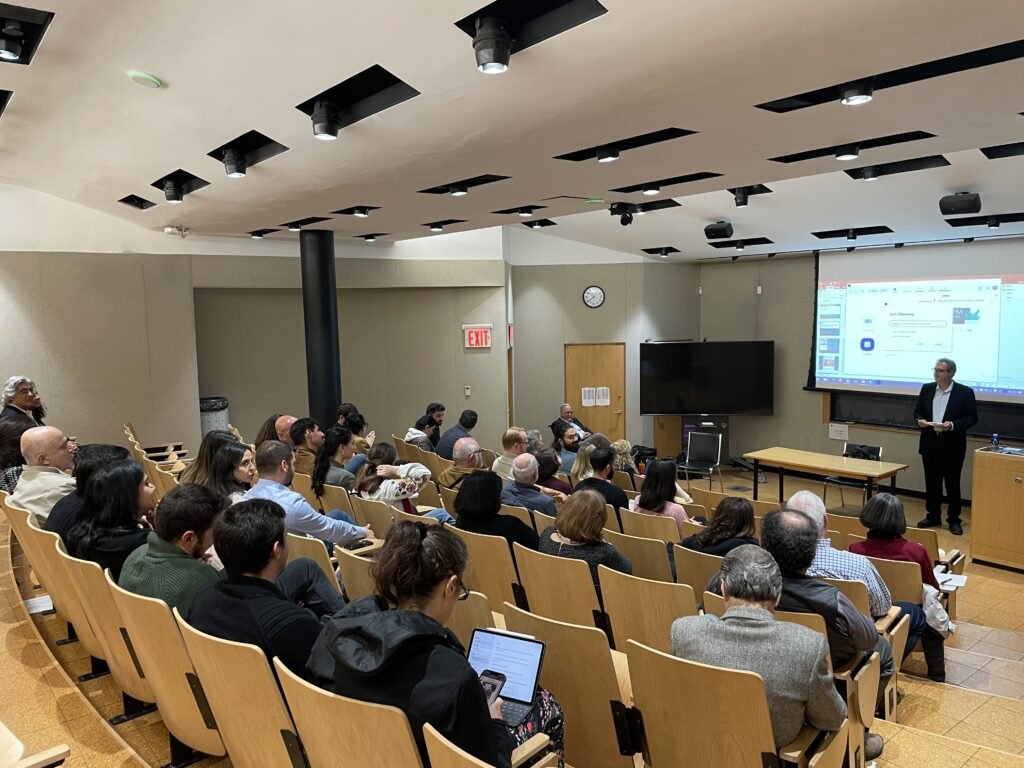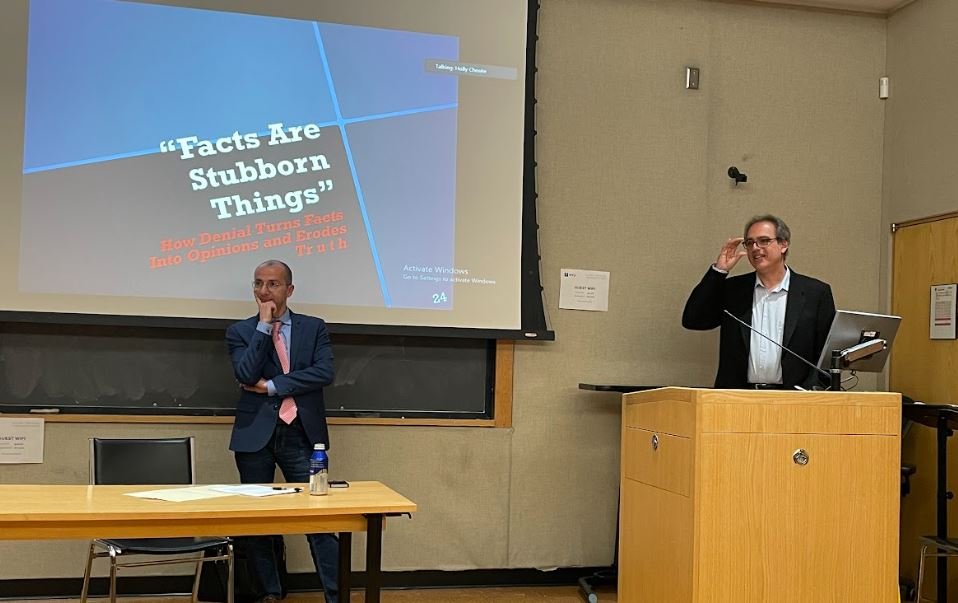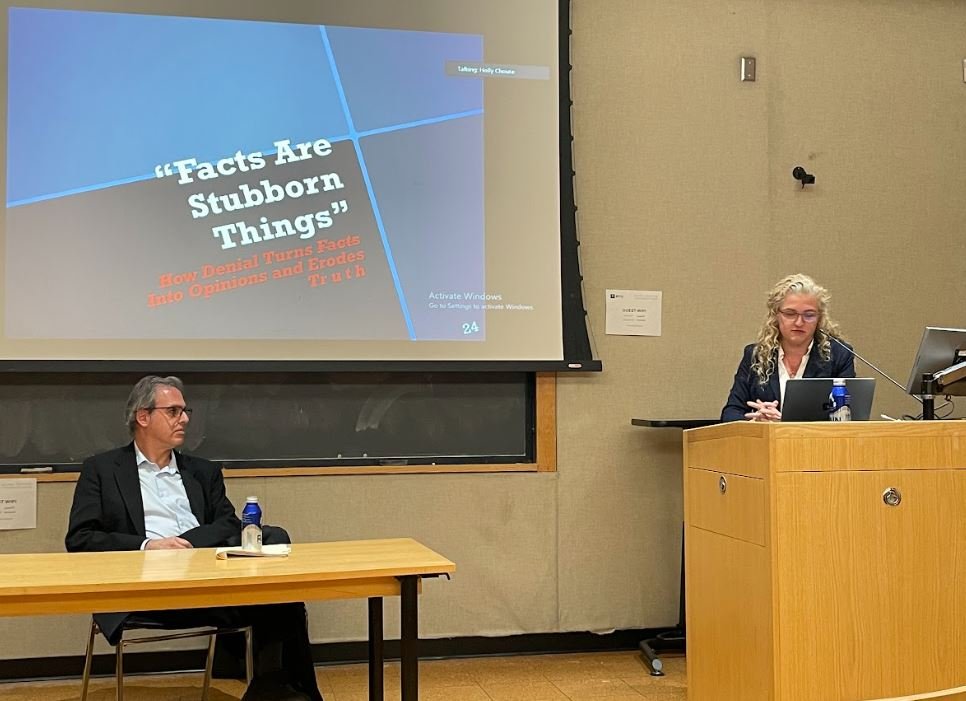
NEW YORK, NY—On April 24, the New York University Global Institute for Advanced Study (NYU GIAS) hosted a presentation titled “Facts Are Stubborn Things: How Denial Turns Facts into Opinions and Erodes Truth.” The event was co-sponsored by the institute’s Armenian Genocide Denial Project and the National Association for Armenian Studies and Research (NAASR). Students, young professionals, scholars and community members gathered to hear speaker Marc Mamigonian and discussant Lerna Ekmekçioğlu, PhD explore recent examples identified as denialist or denialist-influenced and the factors that have contributed to genocide denialism and how it has transformed over time.
Introductions were made by Dr. Paul Boghossian, a professor of philosophy at NYU, and Dr. Khatchig Mouradian a lecturer at Columbia University, who serve as co-principal investigators of the Armenian Genocide Denial Project at NYU.

Mamigonian began his presentation with a series of quotes from John Adams, Hannah Arendt and American civil rights leader Medgar Evers. While Adams believed in the power of truth and fact to prevail, Arendt asserted in her 1967 essay “Truth and Politics” that if a fact is not tolerated in a particular country, efforts may be made to reduce it to opinion. Evers is credited with saying, “You can kill a man but you can’t kill an idea,” but Mamigonian noted that the Ottoman Empire and Turkey have done both: they killed Armenians, and now they are killing the idea (or fact) that they killed the Armenians. Despite the successes of genocide education and recognition in recent decades, Mamigonian argued that these efforts have not succeeded in reducing genocide denialism. He then provided examples of how denialism is occurring in the present day, aided and abetted by so-called scholars, journalists and policy analysts.
He began with an example of the strategy many are familiar with: framing the Armenian Genocide as a controversy rather than a fact. The first publication he turned to was, “Redefining the US-Turkey Relationship,” authored by Sinan Ülgen. Discussing this piece, Mamigonian noted the shift from “hard” denial to “soft” denial. “Hard” denial is blatant denial that the Genocide ever occurred. “Soft” denial occurs when there is an acknowledgement of lives lost during wartime suffering but continues to reject the intent of extermination, resulting in continued neglect of the use of the word “genocide” and ignoring the documentation and scholarship on the subject. This is where phrases such as “The Armenian Question” become a mechanism implemented to undermine facts and scholarship that clearly prove the events as genocide, leading to “he said-she said” debates. Mamigonian made the point that we would never ask Germany to present their “side” of the Holocaust as if there is a question of what occurred at that point in history, so why does society allow and even invite Turkey to present their “side” of the Armenian Genocide? Other topics that fall into this strategy of denial include seeking recognition and empathy for Turkish lives lost during World War I, using the word “feel” when presenting information that should be stated as fact, and weighing Turkish propaganda equally with scholarship.
The second example Mamigonian provided was the article “Turkey Will Never Recognize the Armenian Genocide,” by Hans Gutbrod and David Wood. Two forms of denialism are present in this article: omission of important contextual information that provides a complete political picture and calling upon Armenians to take an allegedly moral high-ground to work towards reconciliation rather than demanding reparations. Mamigonian made a comparison to Native American and African American oppression in the United States. Calling upon Armenians to reconcile could be compared to White Americans asking Native Americans or African Americans to “meet in the middle” and do the social and political labor to repair relations rather than to seek justice, for fear of causing further tensions. Essentially, this calls upon marginalized and oppressed groups to abandon the truth of their histories, further undermining facts. The article also fails to acknowledge the power differential between Turkey and Armenia, with Turkey having more military power to continue efforts of oppression against Armenia, such as blockades and support of Azerbaijan’s attacks on Armenia.
Mamigonian then transitioned to the ways in which denialist narratives contribute to the problems in the present narratives about Artsakh, citing two publications: “Each Rock Has Two Names” by Ghaith Abdul-Ahad and the book The Nagorno-Karabakh Conflict: Historical and Political Perspectives edited by M. Hakan Yavuz and Michael M. Gunter. The first uses an example of Armenian churches and monasteries in Artsakh as proof of their uninterrupted presence in the area. Abdul-Ahad does acknowledge the absurdity of Azerbaijan’s assertion that Armenians erased Azeri inscriptions and took the monuments as their own. However, he contributes to denialist narratives by asserting that the two groups could look at the same monument and see what they would like to see, undermining the truth of what these buildings truly are and no longer making a clear delineation between fact and fiction. Mamigonian summarizes the problematic view perfectly: “Each rock may have two names: but if one side calls the rock a rock and the other insists that the rock is actually a tree, can we not at least agree where the problem lies?” The referenced book, The Nagorno-Karabakh Conflict: Historical and Political Perspectives, which is framed as scholarly material, is riddled with denialist language and historical distortions.
The conclusion of Mamigonian’s presentation highlighted the “kettle logic” of Turkey’s denialist narrative. In kettle logic, multiple arguments are made to defend a single point, but each argument contradicts the others. In Turkey’s case, they make many arguments to deny the Genocide – that it never happened, that it was not a crime, that it was tragic but cannot be called a genocide, etc. The arguments are contradictory, and yet Turkey’s denialist power monopoly seems too big to fail.
After the presentation, a discussion was led by Lerna Ekmekçioğlu. Ekmekçioğlu offered her commentary on Mamigonian’s research. She began by acknowledging the difficulty of studying the topic of denial, specifically focusing on the emotional toll that can result from consistently hearing and reading narratives that deny what occurred in our family histories and noting that Mamigonian’s efforts require great courage and mental/emotional fortitude. Ekmekçioğlu also stated that she felt the discourse about reconciliation was the strongest in the presentation. She distinctly emphasized that those who assert Armenia and Turkey should restore their “pre-conflict relationship” must recognize that the relationship is between colonizers and the colonized.

After her commentary, Ekmekçioğlu posed a series of questions. She asked Mamigonian why softer denial can be more effective than hard denial, to which he replied that it appears less threatening, like the “not as bad” cop in a good cop/bad cop situation. It can give the appearance of attempting to be reasonable in the context of a more extreme assertion, and it is important to remember that hard denial still very much exists. She wondered what motivates some of the aforementioned scholars to participate in or utilize denialist narratives when a political motivation is not apparent. Mamigonian responded that it is not necessarily clear to him why some of these scholars utilize these narratives and also acknowledged that he no longer tries to “peer into the souls” of people who write within denialist frameworks.
Ekmekçioğlu then posed a thorny question: Is it possible that Turkey will recognize the Genocide in a symbolic way that would then undermine reparation efforts? What could this look like? Mamigonian was unsure if Turkey would even be able to make a symbolic recognition since the denialist narrative is entrenched in the state and all it supports. Finally, she asked how to handle the academic centers in high-profile universities being sponsored by Turkey and whether we should ignore them or work harder to build more centers for Armenian studies. Mamigonian stressed that it is vital to pay close attention to these efforts, but emphasized that there is no possibility of outspending Turkey. While we need to create scholarship, it is clear that it will not prevail on its own. Scholarship is absolutely necessary but not by itself sufficient to combat denialist narratives.
During the question-and-answer session with attendees, topics included concerns about Artificial Intelligence (AI, such as ChatGPT) being trained with data sets that promote denialist narratives and how we are at just the beginning of understanding genocide denialism. Armenians are at the forefront of studying the denialist tactics implemented, and further research will continue to illuminate how these tactics are utilized for political manipulation, lack of accountability for crimes and power gains.
Mamigonian is the director of Academic Affairs at the NAASR, where he has worked for the last 25 years. He is the co-author of the volume Annotations to James Joyce’s Ulysses (Oxford University Press, 2022; with John N. Turner and Sam Slote) and is the co-author of annotated editions of James Joyce’s A Portrait of the Artist as a Young Man (Alma Classics, 2014; with John N. Turner) and Ulysses (Alma Classics, 2015, with John N. Turner and Sam Slote). He has served as the editor of the Journal of Armenian Studies and the volume The Armenians of New England (Armenian Heritage Press, 2004), and has published articles in Genocide Studies International, James Joyce Quarterly, Armenian Review, Journal of the Society for Armenian Studies, and elsewhere. His chapter “Weaponizing the First Amendment: Denial of the Armenian Genocide and the U.S. Courts” is forthcoming in Denial of Genocides in the Twenty-First Century, Bedross Der Matossian, ed. (Univ. of Nebraska Press).
Ekmekçioğlu is an associate professor of history at the Massachusetts Institute of Technology and the director of the Women’s and Gender Studies Program. She is a historian of the early Turkish Republic with a particular focus on minorities. Her first monograph Recovering Armenia: The Limits of Belonging in Post-Genocide Turkey was published by Stanford University Press in 2016. In 2006, she co-edited a volume in Turkish on the first five Armenian Ottoman/Turkish feminists. Currently, she is collaborating with Dr. Melissa Bilal (UCLA) for a book and digital humanities project titled Feminism in Armenian: An Interpretive Anthology and Documentary Archive (Stanford U. Press, 2024).



Be the first to comment